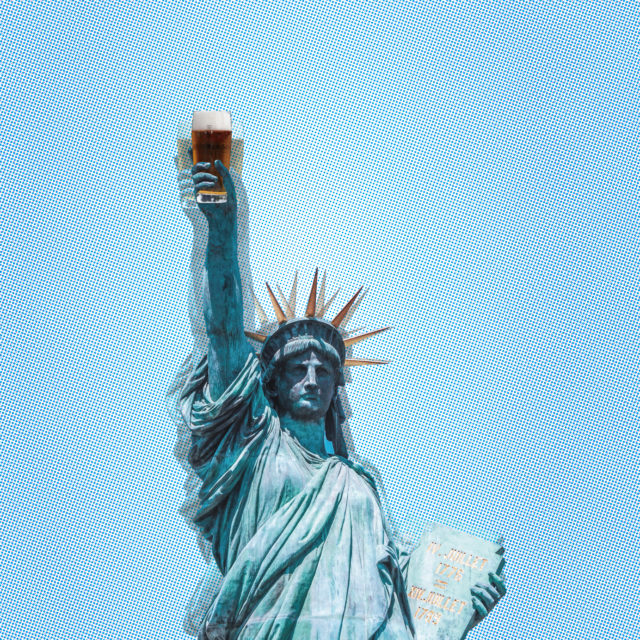American craft beer was born with an anti-establishment pedigree. Battling against well-established national brands of gargantuan scale, early U.S. craft brewers often portrayed themselves as upstarts, rebels, or the smaller guy in the David and Goliath story. Flash-forward to 2019, however, and many U.S. craft breweries have both grown up and calmed down, enjoying access to private equity funding and entering into large-scale mergers, much like the established national brands they originally fought against.
Another sign that U.S. craft beer is substantially less anti-establishment than it was just a generation ago: Around the world, U.S. craft beer frequently serves as an ersatz ambassador for the U.S., appearing at U.S. embassy events and helping to support its homeland’s international profile.
Paul Gatza, senior vice president of the professional brewing division at the Brewers Association, a trade association representing U.S. craft brewers, says that his group has worked with staff at various U.S. embassies on issues like trademarks, as well as helping with diplomatic events that have featured U.S. craft beer.
“The most notable of these efforts — and one we were very involved in — was a beer-and-food-pairing dinner at the ambassador’s residence in Paris last year,” Gatza says.
Hosted by Ambassador Jamie McCourt, that event included personal appearances by influential figures from the American craft scene, including Steve Grossman of Sierra Nevada and Garrett Marrero of Maui Brewing. Over the past several years, similar events have taken place at U.S. ambassadors’ residences in the Netherlands, Austria, Germany, and other countries.
The primary objective of these events is not to promote the U.S., but to increase exports and sales of American craft beer, a goal that falls under the purview of the U.S. Department of Agriculture. Reporting on the 2018 event in Paris, the USDA noted that “global exports of American craft beer grew by 3.6 percent and were worth $125.4 million (in 2017, the latest figures available).”
“They’re basically programs to close the trade gap that the U.S. has had,” Gatza says. “For craft brewers, it’s a chance to build markets in other places. With the U.S. market being very competitive for some of these companies, it can be an important part of their sales portfolio.”
But the benefits run both ways. While the U.S. government works to promote sales of American craft beer abroad, American craft beer also helps to promote the U.S. Just as French embassies use French cuisine to promote the image of France, and South Korea is currently enjoying the benefits of global K-pop fandom, American craft breweries can assist with what is known as soft power in the diplomatic world, part of which can come from an appreciation for a country’s culture. In an era when American political influence is on the wane, it doesn’t hurt the U.S. if the entire planet falls in love with New England IPAs.
California’s Stone Brewing Company has participated in the U.S. Embassy’s annual Fourth of July party and a dinner at the ambassador’s residence in Berlin, among other events. Stone’s executive chairman, Greg Koch, says that in his experience, U.S. craft beer has changed the way people look at America.
“American craft beer has done a tremendous amount for America’s image abroad,” Koch says. “It’s a form of putting a good face on America through craft beer. Showing excellence.”
According to Kelly Stange, the USDA’s agricultural counselor for Germany, Austria, Hungary, the Czech Republic, Slovakia, and Slovenia, the popularity of American craft beer makes it a relatively easy sell to media outlets in the Old World.
“Journalists in Europe are really excited about American craft beer, and they want to experience something different,” Stange says. “There’s a whole foodie scene that’s growing in many cities, and craft beer is part of that. People see it as innovative. They’re interested in it.”
Of course, the list of products promoted by the USDA extends far beyond West Coast IPAs and the latest hazecans. At events like The Flavor of America in Berlin, the USDA highlights American wine and beef, Alaskan seafood, California walnuts, and North Carolina sweet potatoes. In addition, the USDA pushes American hops, which makes a natural crossover with craft beer.
“We did a beer tasting in Frankfurt that included a hops experience table where guests could try to match hops with their beer. There was a craft beer and food pairing in Munich,” Stange says. “We did a hops promotion in Prague, and that’s also part of our repertoire. We brought over Matt Brynildson from Firestone Walker — he works for USA Hops, so he’s promoting hops usage, but he’s also promoting American craft beer.”
And as many Americans see it, he’s promoting one of the very best things about their country, and one that marks a welcome change from a generation ago.
“It’s really amazing to reflect that in just, say, a 20-year period, the United States internationally has gone from being looked at as a sort of laughingstock in the world of beer, to now being what everybody looks towards,” says Koch.
Stange says that promoting American craft beer is a point of pride at the USDA.
“There’s a big push to make a connection between fine dining and beer, and to show that you can use craft beer in a creative way,” she says. “Whenever we can do a craft beer event, everyone’s really proud to share that part of American culture.”
